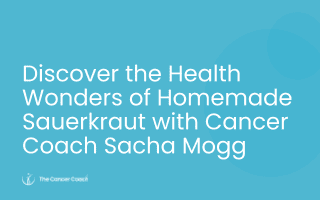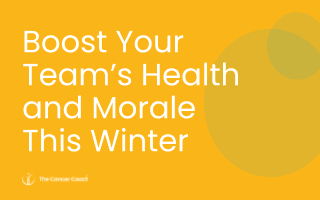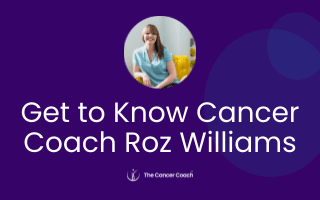This time we cover our interview with Catherine to find out where she grew up and what she loved to do as a kid, what she likes to do in her spare time, what inspires her, the topic of the last passionate debate or conversation, what inhibits the reach of these important messages, the solution, community aspects of the Tree of Life anti-cancer lifestyle community and programme, the biggest barriers to a person improving their health, and more…
Can you tell us a little bit about where you grew up and what you loved to do as a kid?
I’m an only child but growing up I had an abundance of cousins and other family around me, and we did loads of family stuff when I was a kid.
I spent a lot of time with my grandparents on both sides, they were a big part of my life. I always loved spending time with friends and although I wasn’t particularly sporty as a younger child, as a teenager I became a keen runner, hockey player, and netballer.
I grew up in the Cotswolds, around the Chipping Norton area, a really beautiful part of England. It’s quite funny because as a youngster I wanted nothing more than to escape to Oxford or London as soon as I could, you know the lure of the big city, but as I’ve gotten a bit older, I started truly appreciating just how incredible the area is.
What do you like to do in your spare time nowadays?
Just being outside in any weather. It’s so nice to get out with the dog, walking is a big passion of mine.
I’m quite crafty, I’m getting a bit more into my clothes making, something I used to do with my mum years and years ago.
I’m still an avid reader, I try to make as much time as I can to sit down with a book!
What inspired you? A pivotal moment when you thought this is me, this is my life path?
That’s when I started to research everything I could to help my mum. You get desperate don’t you, looking for anything that relates to the situation, and I learned so, so much!
I remember hearing Dorian Yates, the famous bodybuilder, speaking on a podcast years ago. He used an example that has just stuck with me ever since. When you first start learning about health and well-being it’s like a crack in the dam. As you learn about the different approaches that crack gets bigger and bigger, until there’s no going back! The information just starts flowing faster and faster.
And you don’t just learn it, you don’t just read a book or listen to a podcast and think oh that’s interesting! You live it, it becomes your lifestyle!
Then you realise that you CAN reverse your diabetes, something that was previously unheard of in the mainstream. If you can reverse your diabetes, what else can you achieve? What else is achievable, what truly inspirational figures are out there who have redefined the mainstream opinion of health?
As a psychologist I remember first reading David Servan-Schreiber’s “Healing without Freud or Prozac” which is very much about energy and emotional health and offers genuine and clinically proven alternatives to medicine and talk therapy. I experienced a bit of a wow moment. Very much a point where I thought ah, so there is another route to go and explore, I don’t have to stick just to the path I’m currently on.
I would always define myself as an academic, I mean that’s pretty much my main job role. But to me the kind of liberal arts, open minded culture of higher education is what it should all be about. We absolutely should be able to ask those difficult questions. It should be about generating new knowledge and understanding things in a different way.
That’s the whole point for me, that’s where my passion is. It’s not about just regurgitating the same old, same old. It’s thinking about things differently and innovatively and exploring creativity. You need a lot of autonomy to do things this way, to widely broaden your knowledge and I feel very fortunate in that sense. I love the fact that I have been able go down the rabbit holes as and when I find them.
Do you remember the topic of the last passionate debate or conversation that you had?
I’m always very passionate about conversations around health and personal responsibility. Conversations about health and education. Why are we not talking about health and lifestyle medicine more?
Everyone in this space has personal stories don’t we, that’s sadly becoming more common, but it’s always going to be a big one for me in terms of the soap box coming out!
Whose role is it, and whose responsibility is it to keep us healthy? Now, I’m not denying that our environment and other factors play a role, but ultimately, we all have some kind of personal agency when it comes to our health and wellbeing.
The knowledge is out there, but it’s maybe not in the normal channels for a lot of people. That’s something I get really quite passionate about. As health educators and health professionals we know there are alternative ways to look at health that can go so far towards preventing many of the chronic illnesses we suffer. I simply do not understand why this message is not reaching more people.
What do you think inhibits the reach of these all important messages?
As an example, I recently enjoyed a lovely conversation with Izabella from the UKIHCA about food and cooking. We both agreed that a huge amount of essential knowledge has been lost because of us streamlining our lives in the name of progress.
Let’s be honest, it’s a pretty significant switch to go from taking things out of a packet and heating them up, to preparing a healthy and nutritious meal from scratch. There’s a journey there and a whole education process, it’s not just an overnight change to regain those lost skills.
It certainly doesn’t help that adverts for these quick meals are everywhere! That’s not helping anything.
Do you think we will see a time where our medical practitioners spread the message
I work in a medical school, within a college of life sciences. From what I see, this generation of medical professionals has a genuine interest in learning about nutrition, an intrigue for and knowledge of, the benefits of movement, sleep and relaxation. But the medical curriculum is absolutely crammed full as it is, trying to put anything else in is impossible!
They must learn the pillars of biology, physiology, and pharmaceuticals. They also have to study things like trauma and surgery.
If we included all the alternatives we’ve already discussed that would mean these guys are at college for a decade maybe!
Where do you see the solution coming from?
The knowledge isn’t that old! It’s not like it’s some ancient lost manuscript from thousands of years ago. We’re talking a single lifetime. Our grandparents were doing it and doing it well! The knowledge is still there, we just need to make sure it continues along the generational journey!
It’s unbelievable, we see all this technology progressing around us, yet there is a clear devolution of essential knowledge and I strongly believe we need to embark on a mission of re-education.
However, Johann Hari says in his book Stolen Focus that the average modern undergraduate has a nine-minute attention span! How do you study for a degree with a nine-minute attention span? Or perhaps even more importantly what does that tell us about how we teach?
How can we re-embed lost knowledge with nine-minute attention spans?
Maybe the foundation of our education needs to be based on teaching people how to be taught! How to study, how to focus, how to re-absorb the knowledge while some of it remains intrinsic and before it’s too late.
You mentioned Tree of Life, we have been enjoying some fantastic conversations around the community aspect of the programme. I’d love to hear your thoughts.
I love how much planning has gone into developing the Tree of Life community, the discussions around the size of the community being big enough for a person to feel a part of something, but small enough that they don’t feel isolated within a huge group. The dynamics of forming communities based on their progress through the course. Also, the fact that the community will encourage open and engaging conversation but moderate any potentially contentious behaviour.
Actually, that’s quite an interesting point. I’ve been using discussion forums in my teaching for the last ten years or so, and every now and then you come across a couple of characters on a discussion board who are perhaps upsetting a few other users. I mean, they are a real minority, but still, they can have a negative effect on the others.
In my opinion this can be resolved with a bit of consideration and communication. Often the person at fault had no idea that what they said came across offensively or insensitively and when you communicate with them, they are apologetic and proactive and become a powerful force for positivity from that point on. The Tree of Life community has all of this covered in terms of managing the space.
The community aspect is key, and the benefits extend across everything The Cancer Coach and Tree of Life stand for.
Caregivers for example are often so neglected in terms of help and support. My partner has been very poorly with Lyme Disease for some years, I’ve had a bit of an insight in terms of the capacity of a caregiver and it is never an easy role to take on.
There’s something like one in five people in the UK right now who are unpaid caregivers, often juggling the role with another job, house, and family commitments. The opportunity to spend time communicating with other people in the same situation can be extremely valuable and help to promote the message that all caregivers must be able to care for themselves!
The impact that chronic illness has is so widespread and often a little help and support, and feeling a part of something can make all the difference.
Another area where the community aspect is so important is the workplace. I strongly believe that Tree of Life will play a role in developing supportive communities within the workplace.
If the person sitting next to you in the office is experiencing cancer, it’s so important that you and everyone else in the company understands what they are going through. The support network that can be formed with a little education and communication can make all the difference.
Do you see a group of people that tree of life is going to impact the most?
Someone who isn’t necessarily queuing up in the line where they’re handing out pills and medication. Maybe they would be queuing up for lifestyle medicine instead.
I think the word to best describe the individual is empowered! An empowered, proactive, and curious person who wants to make positive changes and take an element of control.
I don’t think it comes down to gender or age. I think there’s more to it than that.
In my professional experience you often come across people who have come to the end of the road with the NHS and the conventional medical system, and I think they will also be hugely responsive to Tree of Life
If you speak to most functional medicine practitioners, a lot of the people that come to them are desperate, because they’ve got to the stage where their doctors are suggesting things that they’re just not comfortable with. More surgery, more invasive treatment.
They are just completely fatigued from the treatment and often they’ve just lost faith in the process. There are a lot of people like that around.
Also, in the current situation there’s the whole waiting list thing isn’t there. People who can’t be seen by a specialist for six months, one year, even two years! I mean that’s just not ok is it, and Tree of Life can offer them something that is focused on supporting them, as well as physically and mentally preparing them for what might be in their medical future.
Another group that I see really benefiting from Tree of Life and the associated messaging is young adults, I want to say 18–25-year-olds. That demographic is the group I work closely with, and they are struggling from a mental health perspective at the moment.
I’m seeing 18-year-olds coming in with what I would describe as quite severe mental health problems. They are functioning, they’re coming into higher education, leaving home, entering what should be an exhilarating time of life, but they seem to not have a lot of hope when I talk to them. They are worried about the future, the fact they won’t be able to afford their own homes, relationships, that sort of thing.
The last thing they would be able to deal with is to hear that terminal cancer is potentially going to add to their issues.
There must be a sensitivity of messaging for sure, but equally there needs to be a balance of messaging that isn’t just sensitive to the situation, but actively builds resilience.
We now do sessions for parents at the University. Now, I know I’m not just speaking for myself when I say that all I needed from my parents was a lift to the Uni gates, help getting my bags from the boot and a kiss goodbye! See you next year! We’re not even talking that long ago.
Nowadays these young adults request that their parents come along to special sessions. This is all in the name of suicide risk management.
A lot of parents are genuinely concerned about their adult aged offspring and feel the need to be a part of the whole process.
Compared to what we experienced with our further education, this is like another world, but it is the reality of what this generation are dealing with. I honestly believe that programmes like the Tree of Life are crucial to helping develop the physical, psychological, and emotional resilience they need to become happy and healthy human beings.
What do you see as the biggest barriers to a person improving their health?
We have all heard of that person who made the decision to radically change their lifestyle and ended up getting divorced because they had nothing in common with their spouse who hadn’t committed to change.
I think you need that support at home, and it requires both partners to be curious and critical thinking.
This also extends to your friendship and peer groups and the physical and social environments.
In my opinion changing a habit isn’t that difficult, it’s making that change in the environment you exist in, surrounded by people you exist with, that makes it hard!
We’ve all been around that friend that says:
“You’re not having a pudding? Why not?”
“Go on have a drink!”
It’s difficult to go to bed when everyone else in the house is watching one more Netflix episode.
Then it’s difficult to get up for that early morning run when everyone else is staying in bed.
The social and physical environments make it really difficult for people to make those health-related changes.
Another of my favourite books is called The Healthy Deviant. The author Pilar Gerasimo explains that to be healthy, you’ve got to have some quite deviant behaviours. You’ve got to be quite unusual and quite quirky. It’s quite an interesting message in the sense that she is supporting people to basically become isolated in their communities, for the sake of their own health and well-being. I actually think her approach is really good.
This all leans back to the whole community conversation earlier. That’s another role for the community isn’t it. To help normalise things like going to bed early, getting up at sunrise, cold water bathing, or whatever it might be that people have decided to do. Maybe eating well, drinking less. You know there are other people out there doing it. You might not see them day to day, but they inspire you and empower you to take control.
A classic example for me is the whole office doughnuts thing. The fuss when someone turns down the Friday doughnut, just because you saying NO causes a reaction in those who are already indulging. Or the being birthday cake in an open office. It can be really hard to be the one person that says no, or the one person that bring a bowl of fruit on their birthday instead of a cake.
The interesting thing is everything we are talking about reflects how we view ourselves. I mean, that friend that says, “oh, go on, you can come out tonight,” is actually thinking “ how has she got the will power to stay at home and have an early night?”
It is much more about how bad you feel about yourself for doing it, than judging others for not doing it. In fact, in my experience, you’re really jealous of the person that’s living well.
The Cancer Coach is an expert international team of highly qualified and experienced practitioners in cancer care and functional medicine. They are experts in their fields and many are cancer survivors themselves. Read about The Cancer Coach™ and our team of oncologists, experts in behaviour science, qualified health coaches, and people just like you.



